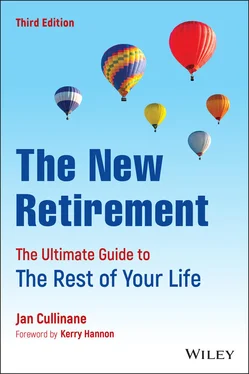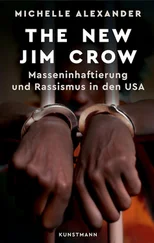Jan Cullinane - The New Retirement
Здесь есть возможность читать онлайн «Jan Cullinane - The New Retirement» — ознакомительный отрывок электронной книги совершенно бесплатно, а после прочтения отрывка купить полную версию. В некоторых случаях можно слушать аудио, скачать через торрент в формате fb2 и присутствует краткое содержание. Жанр: unrecognised, на английском языке. Описание произведения, (предисловие) а так же отзывы посетителей доступны на портале библиотеки ЛибКат.
- Название:The New Retirement
- Автор:
- Жанр:
- Год:неизвестен
- ISBN:нет данных
- Рейтинг книги:5 / 5. Голосов: 1
-
Избранное:Добавить в избранное
- Отзывы:
-
Ваша оценка:
- 100
- 1
- 2
- 3
- 4
- 5
The New Retirement: краткое содержание, описание и аннотация
Предлагаем к чтению аннотацию, описание, краткое содержание или предисловие (зависит от того, что написал сам автор книги «The New Retirement»). Если вы не нашли необходимую информацию о книге — напишите в комментариях, мы постараемся отыскать её.
The New Retirement: The Ultimate Guide to the Rest of Your Life
The New Retirement, 3rd edition,
The New Retirement — читать онлайн ознакомительный отрывок
Ниже представлен текст книги, разбитый по страницам. Система сохранения места последней прочитанной страницы, позволяет с удобством читать онлайн бесплатно книгу «The New Retirement», без необходимости каждый раз заново искать на чём Вы остановились. Поставьте закладку, и сможете в любой момент перейти на страницу, на которой закончили чтение.
Интервал:
Закладка:
Single and/or a Solo Ager?
You may be single by choice or single due to divorce or death of a spouse. As a single, you are among a large and growing cohort of adults. According to 2020 Pew Research figures, 28% of U.S. adults aged 50–64 are single, and 36% over the age of 65 are single. In the over-65 group, 21% of males over 65 are single, and 49% of women are single, partly reflecting, of course, men's shorter life expectancy, along with “gray divorce.” That is why there is a common saying, “Men die married; women die single.” And what about “solo agers” – those without children, without a spouse, and without close relatives? Solo agers comprise about 20% of Boomers.
Being single or a solo ager can have a big effect on retirement planning: It can simplify planning – you only have yourself to look after and you are responsible for your own choices; or it can complicate them – you don't have a partner and/or children or relatives to help navigate retirement (although friends can and often do fill in that gap).
Where to Retire
The 1981 punk rock band The Clash released the catchy “Should I Stay or Should I Go?” They obviously weren't singing about picking up stakes and moving after leaving your primary career or at some point in your retirement, but it's an important question to consider and discuss. Are some places better than others? The short answer is yes.
As mentioned in the Introduction, the pandemic has had an effect on migration patterns within the United States. People realized working remotely is not only an option, but in many cases it's a new normal. Good weather and open spaces that allow you to walk, bike, eat, and play outdoors year-round have become much more desirable. I live in Florida, and I have seen a huge influx of people of all ages relocating and purchasing homes and condos. For example, Marie L.'s oceanfront condo in Florida sold in two days to a New York buyer who purchased it without checking it out in person.
A clever way of determining overall migration patterns is seeing where moving companies are packing up people – and unpacking them. The 2020 U.S. Moving Migration Patterns Report from North American Moving Services lists these states with the most outbound moves: Illinois, New York, California, New Jersey and Maryland. Inbound moves? Idaho, Arizona, South Carolina, Tennessee, North Carolina, Florida, Texas, and Utah.
If we drill down and look at Boomer migration patterns, Realtor.comanalyzed who looked up home sales on their site throughout the United States from ZIP codes where at least 4 out of 10 people were Boomers. (As an aside, it's a little disconcerting to see how we are tracked.)
The top 10 locations that these Boomers looked for online were cities in … Florida! If we examine their data a little more broadly, areas in North Carolina, South Carolina, and Georgia were represented. I guess it really is “better at the beach.”
When those who recently retired are asked about relocating after leaving a primary career, the fairly standard answer is that they want to “age in place.” I get that – you may have lifelong friends, children, grandchildren, many ties to the community, and love where you live. For example, David K. is a homegrown Florida guy. He grew up, went to college, founded his financial services company, and continues to happily live in Florida. I grew up and went to high school and earned my bachelor's and master's degrees in Maryland, but also lived and worked in New Jersey (and was working toward my doctorate there), relocated to Ohio due to my husband's corporate transfer, and moved to Florida in 2006. I can work virtually.
You may be born, grow up, retire, and die in the same area. That plan works for many. But, Chapter 5suggests possibilities for relocation (including “niche” communities such as living on a ship or in a new “green” city), things you should consider when buying or renting a home or if you're considering more than one retirement location, what you must do if you decide to age in place, and what to do when you can no longer care for yourself or your loved ones.
Retirement and Lifespan
There's a lot of research regarding timing of retirement and lifespan. Some studies show early retirement prolongs longevity; other studies show it decreases longevity. A recent study published in the Journal of Epidemiology and Community Health recognized that people sometimes must retire early because of health issues, so this study only enrolled subjects who were similar in health, socioeconomic, and lifestyle factors. The results? Among healthy retirees, a one-year-older age at retirement was associated with an 11% lower risk of all-causes mortality. The researchers' conclusion? “Early retirement may be a risk factor for mortality and prolonged working life may provide survival benefits among U.S. adults.” Food for thought.
Six Secrets for a Successful Retirement
So far, there has been a little retirement history, some statistics, a few important questions to consider, a quiz you should take (“Are You Ready to Launch Your Retirement?”), and a smattering of research about this transition. Now we'll condense what is known about optimizing the chances for a joyful and satisfying retirement, into “The Six Secrets for a Successful Retirement.” Let's briefly address each “secret,” and then do a deeper dive in subsequent chapters.
Secret 1: Have Something to Wake Up For
In addition to a paycheck and perhaps health coverage, work can provide status, intellectual engagement, social interaction and support, purpose, pride, joy, accomplishment, and structure. After leaving your primary career, you'll still want to experience these benefits in your everyday life. Chapters 2and 3explore a host of specific suggestions for a rich, full life, including possibilities for a paycheck after leaving your primary career. (The “Pertinent Quotes” below are from attendees at my retirement talks.)
Pertinent Quote: “Retirement brought a quick collapse to the daily environment I had known for a long time. This gave rise to a lot of issues I had never faced before and working through those issues took time and a lot of work.” – Michael K.
Secret 2: Renegotiate Roles/Cultivate Resilience
There are two chief ways of looking at the world, according to research, that increase the chances for smooth sailing through the transition to retirement: having both an internal locus of control (the belief that outcomes are under one's control), and retirement self-efficacy (the belief or self-confidence that one can cope with the changes retirement brings). Adopt these mind-sets to help ensure a satisfying retirement.
Retiring can be similar to your adolescent years, exciting, but at the same time, often turbulent. Leaving your primary career/job results in shifts in thinking – about time, wants and needs, relationships, perhaps where you live, and thoughts about this “third age” of your life. It's time to concentrate on the present and future – your past doesn't need you anymore! Prior to retiring, if part of a couple, you may have worked out patterns or divisions of labor that worked for you – from making meals to taking out the garbage to washing the dishes to food shopping to doing the laundry to supervising work done around the house to yard work to taking care of children and/or assisting your parents … you get the idea. Now is the time to reconsider and to renegotiate these roles. If old patterns still work, great. If not, it's time to discuss which ones need to be changed or renegotiated.
Author C.S. Lewis said, “You can't go back and change the beginning, but you can start where you are and change the ending.” Lewis is talking about resilience, which is the ability to bounce back after adversity. It's an important ingredient in the recipe for a successful retirement, whether single or coupled. You can cultivate this desirable quality by accepting that change is part of life; by concentrating on changing adverse circumstances that can be altered; by acting decisively rather than wishing problems would just disappear; by maintaining perspective; and by taking big problems and breaking them into smaller, manageable challenges.
Читать дальшеИнтервал:
Закладка:
Похожие книги на «The New Retirement»
Представляем Вашему вниманию похожие книги на «The New Retirement» списком для выбора. Мы отобрали схожую по названию и смыслу литературу в надежде предоставить читателям больше вариантов отыскать новые, интересные, ещё непрочитанные произведения.
Обсуждение, отзывы о книге «The New Retirement» и просто собственные мнения читателей. Оставьте ваши комментарии, напишите, что Вы думаете о произведении, его смысле или главных героях. Укажите что конкретно понравилось, а что нет, и почему Вы так считаете.












